Template recommendation letter for scholarship
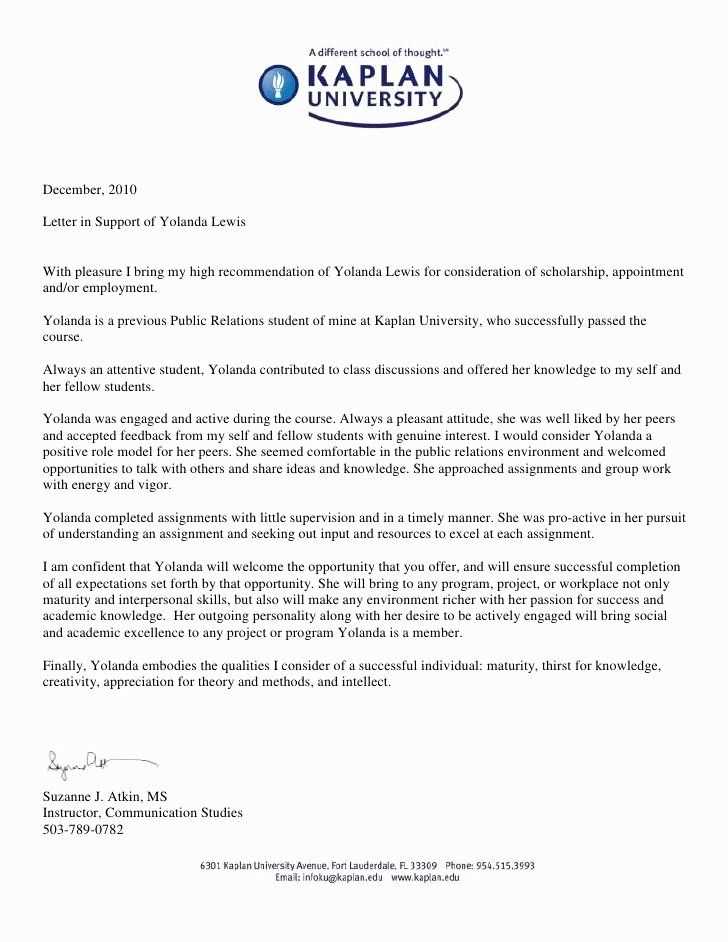
If you’re asked to write a recommendation letter for a scholarship applicant, the goal is to highlight their strengths clearly and persuasively. Start by addressing the scholarship committee, mentioning your relationship with the candidate, and how long you’ve known them. This sets the context for the letter and builds credibility for your endorsement.
For example, you might begin with a sentence like: “I am delighted to recommend [Student’s Name] for the [Scholarship Name], as I have had the pleasure of teaching them for the past [X] years in my [subject] class.” It’s important to be specific about your interactions with the applicant and the qualities that make them stand out, such as their academic achievements, leadership skills, or work ethic.
Next, provide concrete examples of how the applicant has demonstrated these qualities. Instead of vague statements, focus on actions that show their abilities in action. For instance, “[Student’s Name] consistently delivered outstanding projects, demonstrating both creativity and analytical thinking.” This helps the scholarship committee see how the candidate’s skills align with the scholarship’s goals.
Conclude by expressing your strong endorsement of the candidate for the scholarship, reaffirming their potential for success. Make sure to offer your contact information, should the committee wish to discuss the applicant further. A closing statement like “I am confident that [Student’s Name] will continue to excel and make valuable contributions in their academic and professional endeavors.” leaves a lasting impression.
Template Recommendation Letter for Scholarship
Dear [Scholarship Committee],
I am writing to recommend [Student’s Name] for the [Scholarship Name]. I have had the privilege of working with [Student’s Name] for [X years/months] as [his/her/their] [teacher/supervisor/professor] at [Institution Name], and I am confident in [his/her/their] ability to contribute positively to the [field/program].
[Student’s Name] has demonstrated exceptional qualities that make [him/her/them] an ideal candidate for this scholarship. [He/She/They] consistently excels in [academic achievements, leadership, or specific skills]. Specifically, [Student’s Name] has shown remarkable talent in [mention a specific subject, project, or skill], which I believe will significantly contribute to [his/her/their] future success in [related field].
In addition to academic achievements, [Student’s Name] has demonstrated excellent interpersonal skills. [He/She/They] is highly collaborative, respected by peers, and has consistently shown dedication to [specific volunteer work, extracurricular activities, or personal projects]. [His/Her/Their] ability to work under pressure while maintaining a positive and driven attitude is truly commendable.
Based on [his/her/their] academic performance, work ethic, and character, I have no doubt that [Student’s Name] will make a meaningful contribution to the [program or institution]. I strongly support [his/her/their] application and believe that [he/she/they] will excel in all future endeavors with the aid of the [Scholarship Name].
If you require any further information, please do not hesitate to contact me at [Your Contact Information].
Sincerely,
[Your Full Name]
[Your Title/Position]
[Institution Name]
How to Format Your Scholarship Recommendation Letter
Begin with a formal salutation. Address the letter to the specific person or committee reviewing the scholarship applications, if possible. Use “Dear [Title] [Last Name]” for an individual, or “Dear Scholarship Committee” for a group.
The opening paragraph should clearly state the purpose of the letter. Mention how long you’ve known the applicant and in what capacity. Establish your relationship with the student to provide context for your recommendation.
In the body of the letter, focus on the student’s strengths and achievements that align with the scholarship’s criteria. Use specific examples that highlight the student’s work ethic, character, and academic or extracurricular accomplishments. Avoid vague statements and provide concrete evidence of their qualifications.
In the concluding paragraph, briefly reiterate your endorsement of the applicant for the scholarship. Offer your contact information for any follow-up questions and express willingness to provide additional information if needed. Finish with a formal closing, such as “Sincerely” or “Best regards,” followed by your signature and title.
What Information to Include in the Opening Paragraph
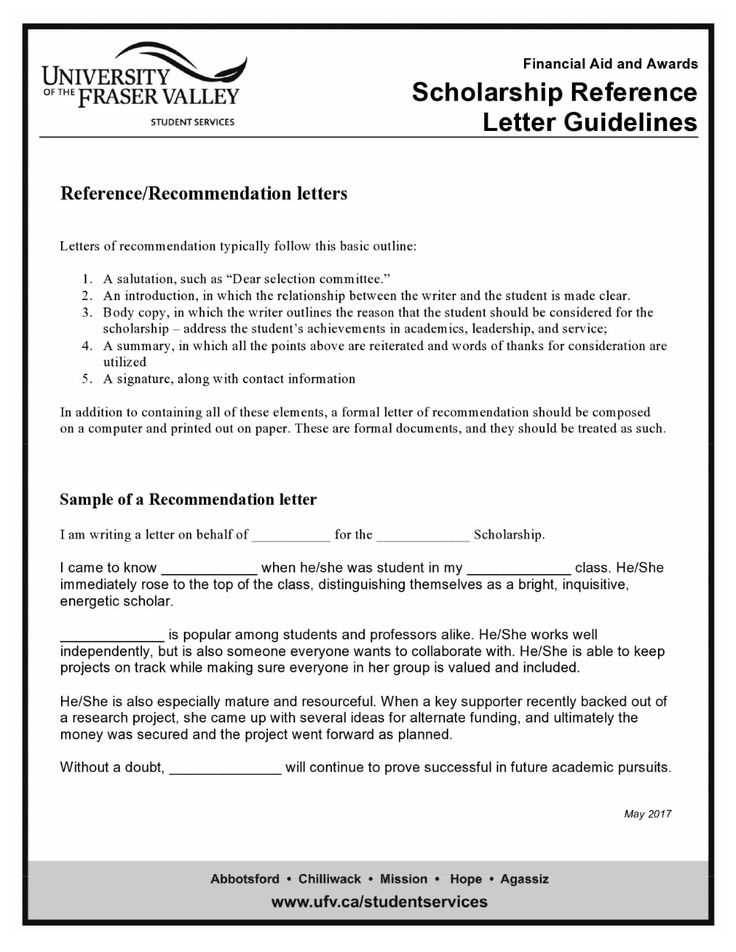
Begin by clearly stating the purpose of the letter. Mention the scholarship you are recommending the applicant for, ensuring the recipient understands the context immediately. Introduce the applicant briefly, including their name and your relationship with them, whether as a teacher, mentor, or supervisor. Keep it concise and focused on their eligibility and suitability for the scholarship. Highlight any specific traits or achievements that make the candidate stand out, aligning them with the scholarship’s objectives.
Highlighting the Applicant’s Achievements and Skills
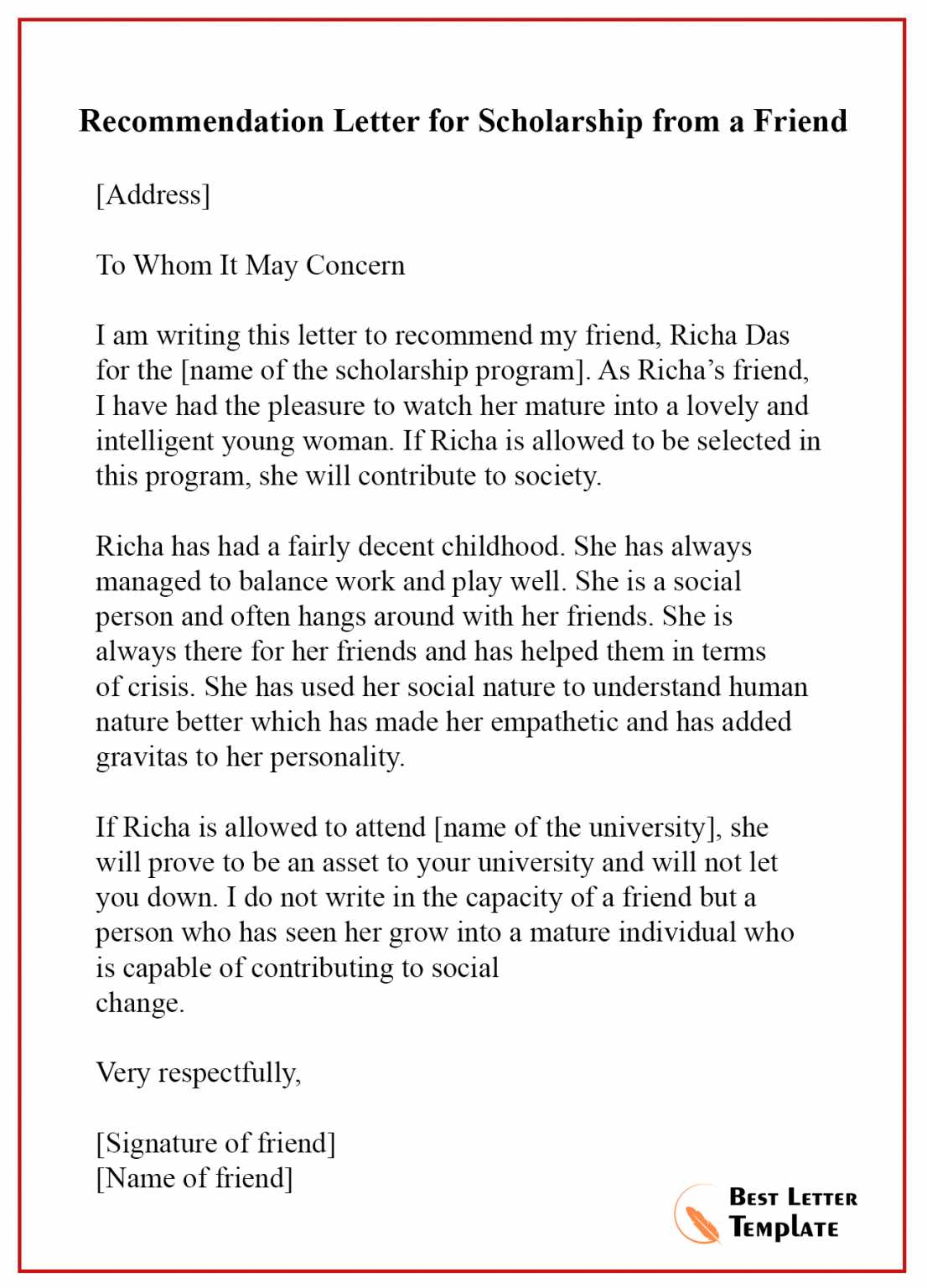
Throughout their academic career, [Applicant Name] has consistently demonstrated a strong aptitude for [subject/field], excelling in both practical and theoretical aspects. Their exceptional performance in [specific achievement, project, or course] not only reflects their dedication but also their ability to apply learned concepts to real-world situations.
In addition to their academic strengths, [Applicant Name] has developed remarkable skills in [specific skill or area, e.g., leadership, communication, critical thinking]. For example, they led a team project on [specific project] where they successfully coordinated the efforts of their peers to achieve [specific outcome]. This experience highlighted their capacity to take initiative, solve complex problems, and guide others toward a common goal.
Furthermore, [Applicant Name] has proven their adaptability by excelling in [specific extracurricular activity, internship, or volunteer experience]. They managed to balance these responsibilities with their academic workload, showcasing their time-management and organizational skills. Their contributions in [specific area or role] have had a positive impact, further demonstrating their commitment to both personal and collective success.
It is clear that [Applicant Name] possesses the skills, drive, and determination necessary to excel in [program or scholarship name]. Their achievements thus far provide a strong foundation for their continued success, and I am confident they will thrive in any challenging environment they encounter.
Demonstrating the Applicant’s Potential for Academic Success
The applicant has consistently shown strong intellectual capabilities and a commitment to academic excellence. They have maintained a high GPA, excelling in both core and elective subjects, demonstrating their ability to handle challenging coursework. Their performance in advanced mathematics and science courses further highlights their capacity for critical thinking and problem-solving skills.
In addition to their academic achievements, the applicant’s proactive approach to learning sets them apart. They actively engage with course material, often going beyond the required readings to explore related topics. This curiosity is reflected in their high-quality projects and well-thought-out presentations, where they consistently demonstrate a deep understanding of complex concepts.
Consistent Achievement in Challenging Environments
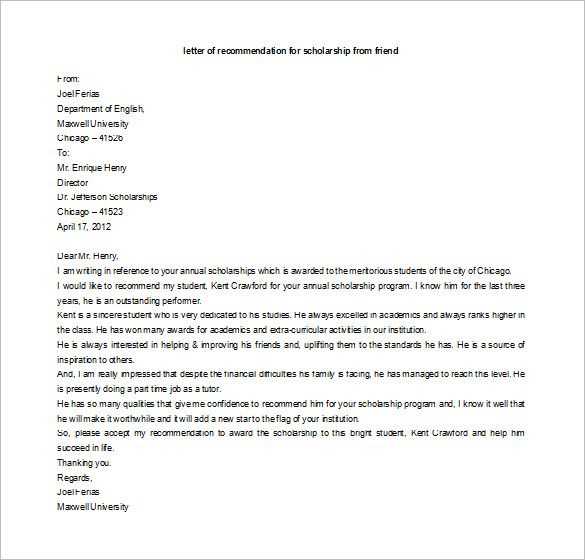
The applicant has consistently excelled in high-pressure academic environments, whether during tight deadlines or complex assignments. They have displayed remarkable time management skills, balancing their academic responsibilities with extracurricular involvement, all while maintaining exceptional grades. Their ability to meet deadlines without compromising quality speaks to their discipline and focus on academic success.
Leadership and Initiative in Academic Projects
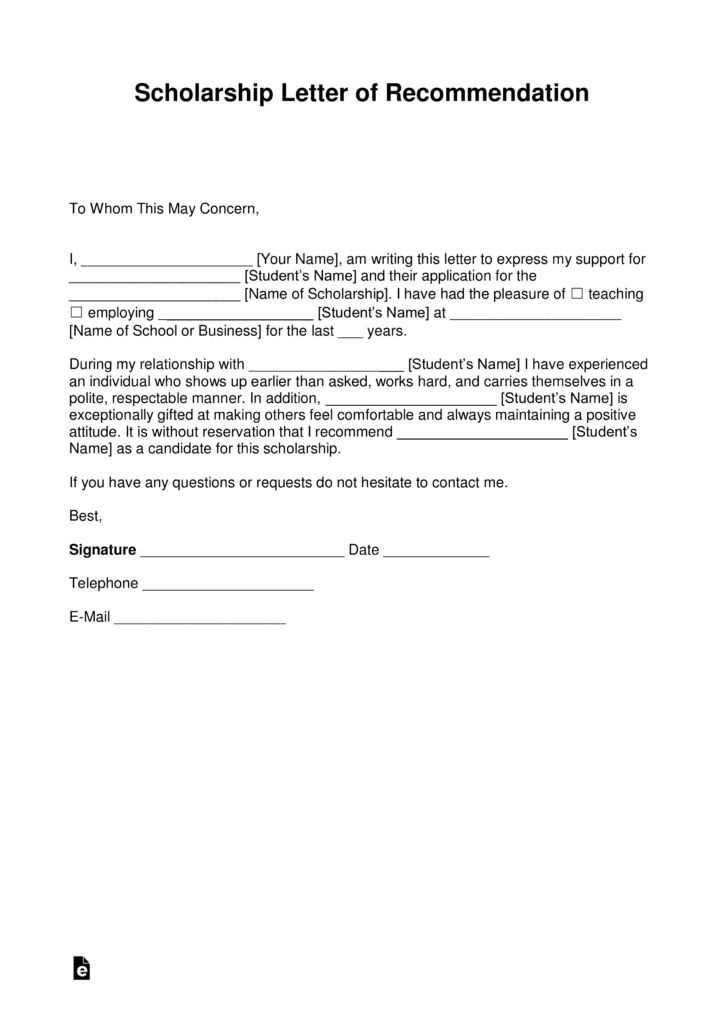
Through their leadership roles in group projects, the applicant has demonstrated both initiative and collaboration skills. They take on responsibilities with enthusiasm, providing guidance and motivation to peers. This leadership quality, coupled with a natural ability to work in diverse teams, shows that they are not only capable of thriving individually but also excel in collaborative academic settings.
Providing Specific Examples of the Applicant’s Character
In every project or task, Sarah consistently demonstrates remarkable leadership and initiative. A clear example is her work on the school’s community outreach project, where she led a team of volunteers to create a mentorship program for younger students. She took the lead in organizing weekly meetings, ensuring everyone stayed on track, and handled challenges with professionalism. Her ability to listen to others and integrate their ideas into the program was a key factor in its success.
Leadership and Problem-Solving Skills
Sarah’s leadership extends beyond organizing. During the project’s initial phase, she identified several logistical issues that were hindering the team’s progress. Rather than waiting for direction, she independently researched and implemented solutions, improving the program’s efficiency. Her quick thinking and adaptability played a significant role in overcoming these obstacles.
Empathy and Commitment
Another example of Sarah’s character is her dedication to helping others. She recently volunteered at a local shelter, where she spent several hours each week assisting with meal preparation and organizing donations. Her genuine concern for the well-being of others shone through in her actions and communication. She never hesitated to go above and beyond, whether it was by staying late to ensure the shelter had enough volunteers or offering assistance to those in need.
| Example | Impact |
|---|---|
| Community outreach project leadership | Successfully launched a mentorship program, improved team collaboration and morale |
| Problem-solving in the outreach project | Resolved key logistical issues, increasing program efficiency |
| Volunteering at a local shelter | Provided significant support to the shelter, demonstrating commitment and empathy |
Sarah’s character is defined by her ability to lead with empathy, take initiative in difficult situations, and remain deeply committed to helping others. These qualities make her an outstanding candidate for this scholarship.
Concluding Your Scholarship Recommendation with Impact
Wrap up your recommendation with a strong statement that reflects your confidence in the candidate’s potential. Emphasize their ability to excel in the scholarship program by highlighting their unique qualities. Reinforce how their past achievements and character make them an ideal fit for the opportunity. Offer a clear endorsement that leaves no doubt about their capabilities.
End with a direct invitation to contact you for further details, ensuring your availability to provide more insight if needed. Keep the tone positive and assertive, affirming the value the candidate will bring to the program. Make sure your closing sentence reflects your genuine belief in their success and readiness to contribute.